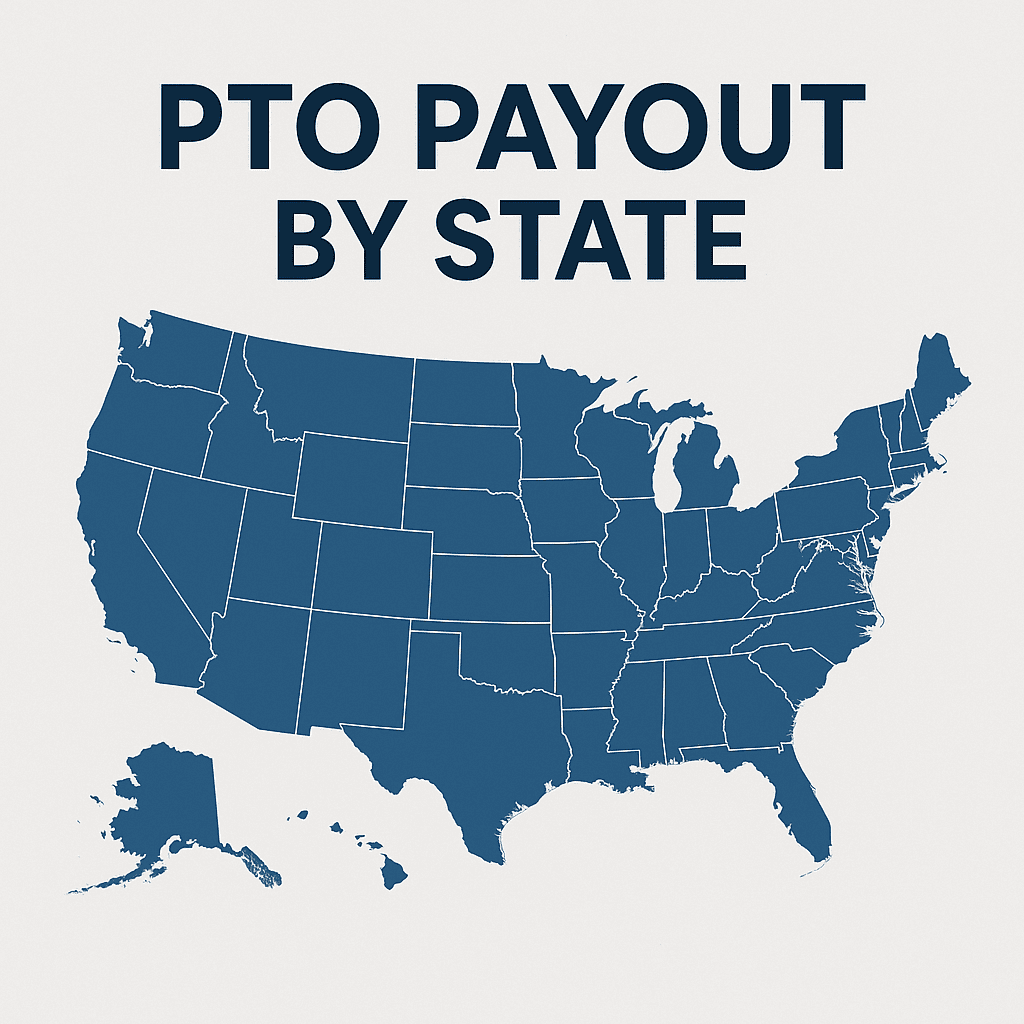
One Size Does Not Fit All
Managing paid time off (PTO) seems simple... until it isn’t. While federal law doesn’t require employers to provide vacation or paid leave, nearly every company has some form of PTO policy, whether it’s vacation time, sick leave, personal days, or a banked system. The real complexity comes when employment ends, because state laws, not federal, govern whether unused time off must be paid out.
If your business operates in just one state, this may be straightforward. But for multi-state employers or remote teams, the patchwork of PTO payout laws can create real risk. Some states treat vacation as earned wages that must be paid at termination, other differentiate between sick and vacation, while some also discuss accrued verses awarded. Others defer entirely to employer policy. A few go further, imposing fines, interest, or even criminal penalties for failure to follow wage laws.
At My Support Staff, we’ve compiled a state-by-state breakdown of regulations that impact your PTO, sick, and vacation payout strategy. This includes whether states require PTO payout, allow use-it-or-lose-it policies, and what penalties apply if final wages go unpaid. Use this as a guide to help assess whether your current policies align with your legal obligations, and where you may need to revise your employee handbook, termination procedures, or payroll practices.
Payout Chart
| State | PTO Payout Requirement | Can Employer Set Forfeiture Policy? | Public vs. Private Sector Differences | Statute / Law Code | Penalty for Non-Compliance |
|---|---|---|---|---|---|
| Alabama | ❌ | Yes | Policy applies to private employers only | No specific statute | None |
| Alaska | ⚠️ | Yes, if clearly defined in writing | Applies to both sectors | Alaska Stat. § 23.05.140 | Up to 90 days' wages or until paid |
| Arizona | ⚠️ | Yes, if clearly defined in writing | Applies primarily to private employers | A.R.S. § 23-353 | Triple damages or wage claim (up to $5,000) |
| Arkansas | ⚠️ | Yes, if clearly defined in writing | Public sector must pay accrued leave | Ark. Code Ann. § 11-4-405 | Double wages after 7 days overdue |
| California | ✅ | No – not permitted | Applies to both; CBAs may differ | CA Labor Code §227.3 | Up to 30 days of wages at regular rate |
| Colorado | ✅ | No – not permitted | Applies to all employers | CO Rev. Stat. § 8-4-101 | 2x wages owed or $1,000 minimum; increases for willful violations |
| Connecticut | ⚠️ | Yes | Employer policy governs all sectors | Conn. Gen. Stat. § 31-76k | Up to 2x unpaid wages, possible fines or jail |
| Connecticut | ⚠️ | Yes | Employer policy governs all sectors | Conn. Gen. Stat. § 31-76k | Up to 2x unpaid wages, possible fines or jail |
| Delaware | ⚠️ | Yes | Policy governs all sectors | 19 Del. C. § 1109 | 10% daily penalty until paid |
| District of Columbia | ⚠️ | Yes | Policy governs both public and private | D.C. Code § 32–1303 | 10% per day of unpaid wages |
| Florida | ❌ | Yes | Policy-based; not governed by statute | No specific statute | None |
| Georgia | ❌ | Yes | Policy-based, applies to private employers | No specific statute | None |
| Hawaii | ⚠️ | Yes, if in policy or contract | Applies to private employers; public by separate rules | Haw. Rev. Stat. § 388-3 | Civil or criminal penalties may apply |
| Idaho | ⚠️ | Yes | Policy applies to private employers | Idaho Code § 45-606 | Up to 15 days’ wages or $750 |
| Illinois | ✅ | Yes, if clearly communicated and reasonable opportunity to use is provided | Applies to all unless union contract states otherwise | 820 ILCS 115/5 | 5% monthly interest; administrative fees from $250 to $1,000 |
| Indiana | ✅ | Yes, if clearly written and communicated | Applies to private employers | Ind. Code § 22-2-9 | 10% per day, up to 2x owed |
| Iowa | ⚠️ | Yes | Policy governs both sectors | Iowa Code § 91A.4 | $500 fine + 5% daily penalty |
| Kansas | ⚠️ | Yes | Policy governs both sectors | Kan. Stat. § 44-314 | 1% daily penalty, up to 100% |
| Kentucky | ⚠️ | Yes | Policy applies to private employers | KRS § 337.055 | $100 to $1,000 per violation |
| Louisiana | ✅ | Yes, if stated in policy | Applies to all; exceptions by union contract | La. Rev. Stat. § 23:631 | Up to 90 days’ wages + legal fees |
| Maine | ✅ | No – must pay if 11+ employees | Applies to private employers with 11+ employees | 26 M.R.S. § 626 | 2x wages, interest, and attorney’s fees |
| Maryland | ✅ | Yes, if in written policy | Applies to private employers | Md. Code, Labor & Employment § 3-505 | $100–$500 fine; lawsuit allowed |
| Massachusetts | ✅ | Yes, with notice and policy | Applies to both sectors | M.G.L. c. 149, § 148 | Triple damages and potential fines |
| Michigan | ⚠️ | Yes, if included in written policy | Policy governs both sectors | Mich. Comp. Laws § 408.471 | 10% annual interest + $1,000 fine |
| Minnesota | ✅ | Yes, if clearly defined in policy | Applies to private employers | Minn. Stat. § 181.13 | Up to 15 days' average earnings |
| Mississippi | ❌ | Yes | Policy applies to private employers | No specific statute | None |
| Missouri | ⚠️ | Yes | Vacation not treated as wages | Mo. Rev. Stat. § 290.110 | Wages accrue up to 60 days |
| Montana | ✅ | No – vacation is considered wages | Applies to all employers | Mont. Code Ann. § 39-3-205 | 110% of owed wages + possible misdemeanor |
| Nebraska | ✅ | No – must be paid if earned | Policy applies to all employers | Neb. Rev. Stat. § 48-1229 | 2x unpaid wages + 25% attorney fees |
| Nevada | ⚠️ | Yes, if included in policy | Applies to private employers | Nev. Rev. Stat. § 608.020–608.050 | Wages accrue for up to 30 days |
| New Hampshire | ⚠️ | Yes, with notice | Employer policy governs | N.H. Rev. Stat. § 275:43 | 10% of unpaid wages per day |
| New Jersey | ⚠️ | Yes, if stated in written policy | Policy governs both sectors | N.J. Stat. § 34:11-4.2 | 10–25% admin fee + fines up to $500 |
| New Mexico | ✅ | No – vacation is considered wages | Applies to all employers | N.M. Stat. Ann. § 50-4-2 | Up to 60 days' wages + criminal penalties |
| New York | ⚠️ | Yes, with advance written notice | Policy governs both sectors | N.Y. Labor Law § 195 | Liquidated damages up to 100% |
| North Carolina | ✅ | Yes, must be in writing and posted | Applies to all employers | N.C. Gen. Stat. § 95-25.13 | Wages + liquidated damages + interest |
| North Dakota | ✅ | Yes, under 3-part rule | Must notify at hire; different rules for voluntary/involuntary terminations | N.D. Admin. Code § 46-02-07-02 | Up to 3x unpaid wages + interest |
| Ohio | ⚠️ | Yes, if written in policy | Policy governs all employers | Ohio Rev. Code § 4113.15 | 6% or $200 minimum |
| Oklahoma | ⚠️ | Yes | Policy governs both sectors | Okla. Stat. tit. 40 § 165.3 | 2% per day of wages unpaid |
| Oregon | ⚠️ | Yes | Policy governs private sector | Or. Rev. Stat. § 652.140 | Up to 30 days' wages |
| Pennsylvania | ⚠️ | Yes, if included in policy | Policy governs both | 43 P.S. § 260.5 | 25% of unpaid or $500 minimum |
| Rhode Island | ✅ | Not permitted after 1 year employment | Applies to employees after 1 year | R.I. Gen. Laws § 28-14-4 | 2x wages + fines or jail |
| South Carolina | ⚠️ | Yes | Private employer policies govern | S.C. Code § 41-10-50 | 3x unpaid wages + fines |
| South Dakota | ❌ | Yes | Policy-based only | No specific statute | None |
| Tennessee | ⚠️ | Yes | Private employers only | Tenn. Code § 50-2-103 | $100–$1,000 fine + criminal penalties |
| Texas | ⚠️ | Yes, if clearly written in policy | Applies primarily to private employers | No specific statute; guided by TX Payday Law | Up to $1,000 or amount of unpaid wages |
| Utah | ⚠️ | Yes, if clearly stated | Policy governs both sectors | Utah Code § 34-28-5 | Up to 60 days' wages if not paid on demand |
| Vermont | ⚠️ | Yes | Policy-based | 21 V.S.A. § 342 | $5,000 fine + 2x wages |
| Virginia | ⚠️ | Yes | Policy governs both | Va. Code § 40.1-29 | Interest + fines or criminal penalties |
| Washington | ⚠️ | Yes | Policy governs both | RCW 49.48.010 | Fines, interest, civil penalties |
| West Virginia | ✅ | Yes, if stated in writing | Policy governs both | W. Va. Code § 21-5-4 | 2x unpaid wages |
| Wisconsin | ⚠️ | Yes, if written and communicated | Applies to private employers | Wis. Stat. § 109.03 | $500 fine + up to 2x wages |
| Wyoming | ⚠️ | Yes, if policy gives reasonable use opportunity | Policy governs both | Wyo. Stat. § 27-4-104 | $200/day + misdemeanor |
One Policy, Many Jurisdictions—What’s Your Next Step?
If reviewing this chart left you with more questions than answers, you're not alone. Even the most well-meaning employers struggle to keep up with changing regulations, especially when managing PTO across multiple locations, varying job classifications, or remote teams.
The reality is that a "one-size-fits-all" PTO policy rarely works when compliance is on the line. From documenting forfeiture clauses to processing final paychecks accurately and on time, it’s easy to overlook small details that can lead to big consequences, wage claims, penalties, or strained employee relations.
Whether you're building your PTO policy from scratch, revising it for multi-state compliance, or just want a second set of eyes on your termination pay process, we are here to help.
Let Us Help You Get It Right
At My Support Staff, we help companies simplify complex HR challenges, like PTO compliance, so they can focus on running their business. If you need help:
Auditing your PTO and vacation payout policy Aligning multi-state requirements into one clean process Updating your handbook to reflect accurate, enforceable language Training your managers or payroll team on what to do at termination
Reach out today. Let’s make compliance the easiest part of your HR strategy.
⚖️ Disclaimer
This guide is provided for general informational purposes only and is not intended to constitute legal advice. While we make every effort to ensure the accuracy and timeliness of the information presented, employment laws, including PTO payout rules, can change frequently and may vary based on your specific circumstances, policies, and collective bargaining agreements.
Every organization is unique, and compliance needs may differ depending on your industry, locations, and workforce structure. We strongly recommend consulting with a qualified employment attorney or legal advisor before making any policy changes or termination decisions based on this information.


